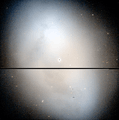NGC 1360
| NGC 1360 | |
|---|---|
|
NGC 1360 | |
| Observation data (Epoch J2000) | |
| Right ascension | 03h 33m 14.646s[1] |
| Declination | −25° 52′ 18.214″[1] |
| Distance |
1,145 ly (351 pc)[1] 1,794 ly (550 pc)[2] |
| Apparent magnitude (V) | 9.4[3] |
| Apparent dimensions (V) | 11.0 × 7.5 arcmin[3] |
| Constellation | Fornax |
| Physical characteristics | |
| Notable features | 11.4v magnitude central star[3] |
| Other designations | PK220-53.1, ESO 482-PN007, AM 0331-260, GC 5315, PN G220.3-53.9, CD-26 1339 |
NGC 1360, also known as the Robin's Egg Nebula,[4] is a planetary nebula in the constellation of Fornax. It was identified as a planetary nebula due to its strong radiation in the OIII (oxygen) bands. Reddish matter, believed to have been ejected from the original star before its final collapse, is visible in images.[5] It is slightly fainter than IC 2003.
NGC 1360 was discovered in January 1868 by the German astronomer Friedrich August Theodor Winnecke.[6]
Gallery
-

Hubble Space Telescope image
References
- 1 2 3 "SIMBAD Astronomical Database". Results for NGC 1360. Retrieved 2011-06-03.
- ↑ Smith, H. (9 April 2015). "On the distances of planetary nebulae" (PDF). Monthly Notices of the Royal Astronomical Society 449 (3): 2980–3005. doi:10.1093/mnras/stv456.
- 1 2 3 "NGC/IC Project". Results for IC 1295. Retrieved 2011-06-03.
- ↑ http://www.myastrostuff.com/pncollection/ngc1360.htm
- ↑ http://www.astrosurf.com/antilhue/ngc1360.htm Astrosurf
- ↑ Students for the Exploration and Development of Space. "Friedrich August Theodor Winnecke (February 5, 1835 - December 3, 1897)". http://seds.org/. Retrieved March 18, 2012. External link in
|publisher=(help)
External links
- NGC 1360 on WikiSky: DSS2, SDSS, GALEX, IRAS, Hydrogen α, X-Ray, Astrophoto, Sky Map, Articles and images
This article is issued from Wikipedia - version of the Monday, January 25, 2016. The text is available under the Creative Commons Attribution/Share Alike but additional terms may apply for the media files.
